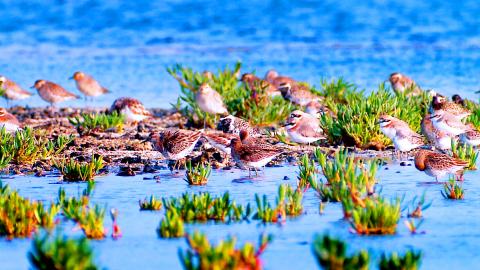The Ministry of Science and Technology is to boost scientific facilities on the Pratas Islands (Dongsha Islands, 東沙群島) and Itu Aba Island (Taiping Island, 太平島), and increase collaborations with Southeast Asian countries, a ministry official said yesterday.
Minister of Science and Technology Chen Liang-gee (陳良基) on Friday led a delegation of 64 government officials and researchers to inspect facilities on Pratas, and meet with US and Japanese scientists.
The inspection is part of the ministry’s four-year Integrated Program for Intelligent Prevention of Natural Disasters and International Cooperative Research on Earth Sciences in Southeast Asia, which began last month and runs through 2022, Department of Natural Sciences and Sustainable Development Director-General Wu Chun-chieh (吳俊傑) said.

Photo: Copy by Tsai Ching-hua, Taipei Times
The program — composed of four subsidiary projects — aims to boost the nation’s atmospheric, maritime, Earth science and disaster prevention research efforts on and around the islands, and to share technologies with countries included in the government’s New Southbound Policy, Wu said.
First, the ministry plans to enhance research equipment at the scientific research station on Pratas, as well as improve its maintenance and support systems, with National Sun Yat-sen University professor of oceanography Soong Ker-yea (宋克義) serving as project head, Wu said.
Humanities researchers were part of the inspection, with an eye to inspiring new research based on the island’s extraordinary social and cultural conditions, he said.
On Itu Aba, the ministry is seeking to advance atmospheric observations by upgrading surface-based observation infrastructure, installing new cloud observation facilities and launching more climate data-gathering equipment, with National Taiwan University Department of Atmospheric Science chair Lin Po-Hsiung (林博雄) leading the project, Wu said.
The third project is to share the nation’s disaster prevention and early-warning systems for earthquakes with Southeast Asian countries, given that “Taiwan is a leader in disaster prevention studies in the region,” Wu said, adding that the project would be managed by National Science and Technology Center for Disaster Reduction Director Hongey Chen (陳宏宇).
Through the fourth project, the ministry plans to fortify connections between Taiwanese and Southeast Asian academics, and foster student and expert exchanges, with Academia Sinica Institute of Earth Sciences director Chung Sun-lin (鍾孫霖) leading the project, Wu said.
Hopefully, the projects would enlarge the nation’s presence on the global stage and lead to more bilateral and multilateral collaborations, Wu said, adding that the ministry is focused on scientific research and collaborations, not political issues.
The ministry is to share research findings with scientists working for Year of the Maritime Continent, a two-year project that began last year to study the climate of the Earth’s largest archipelago, which stretches from the Indian Ocean to the Pacific Ocean, Wu said, adding that Taiwan contributes by sharing observations collected on Itu Aba and Pratas.

CHAOS: Iranians took to the streets playing celebratory music after reports of Khamenei’s death on Saturday, while mourners also gathered in Tehran yesterday Iranian Supreme Leader Ayatollah Ali Khamenei was killed in a major attack on Iran launched by Israel and the US, throwing the future of the Islamic republic into doubt and raising the risk of regional instability. Iranian state television and the state-run IRNA news agency announced the 86-year-old’s death early yesterday. US President Donald Trump said it gave Iranians their “greatest chance” to “take back” their country. The announcements came after a joint US and Israeli aerial bombardment that targeted Iranian military and governmental sites. Trump said the “heavy and pinpoint bombing” would continue through the week or as long

TRUST: The KMT said it respected the US’ timing and considerations, and hoped it would continue to honor its commitments to helping Taiwan bolster its defenses and deterrence US President Donald Trump is delaying a multibillion-dollar arms sale to Taiwan to ensure his visit to Beijing is successful, a New York Times report said. The weapons sales package has stalled in the US Department of State, the report said, citing US officials it did not identify. The White House has told agencies not to push forward ahead of Trump’s meeting with Chinese President Xi Jinping (習近平), it said. The two last month held a phone call to discuss trade and geopolitical flashpoints ahead of the summit. Xi raised the Taiwan issue and urged the US to handle arms sales to

State-run CPC Corp, Taiwan (CPC, 台灣中油) yesterday said that it had confirmed on Saturday night with its liquefied natural gas (LNG) and crude oil suppliers that shipments are proceeding as scheduled and that domestic supplies remain unaffected. The CPC yesterday announced the gasoline and diesel prices will rise by NT$0.2 and NT$0.4 per liter, respectively, starting Monday, citing Middle East tensions and blizzards in the eastern United States. CPC also iterated it has been reducing the proportion of crude oil imports from the Middle East and diversifying its supply sources in the past few years in response to geopolitical risks, expanding

Pro-democracy media tycoon Jimmy Lai’s (黎智英) fraud conviction and prison sentence were yesterday overturned by a Hong Kong court, in a surprise legal decision that comes soon after Lai was jailed for 20 years on a separate national security charge. Judges Jeremy Poon (潘兆初), Anthea Pang (彭寶琴) and Derek Pang (彭偉昌) said in the judgement that they allowed the appeal from Lai, and another defendant in the case, to proceed, as a lower court judge had “erred.” “The Court of Appeal gave them leave to appeal against their conviction, allowed their appeals, quashed the convictions and set aside the sentences,” the judges